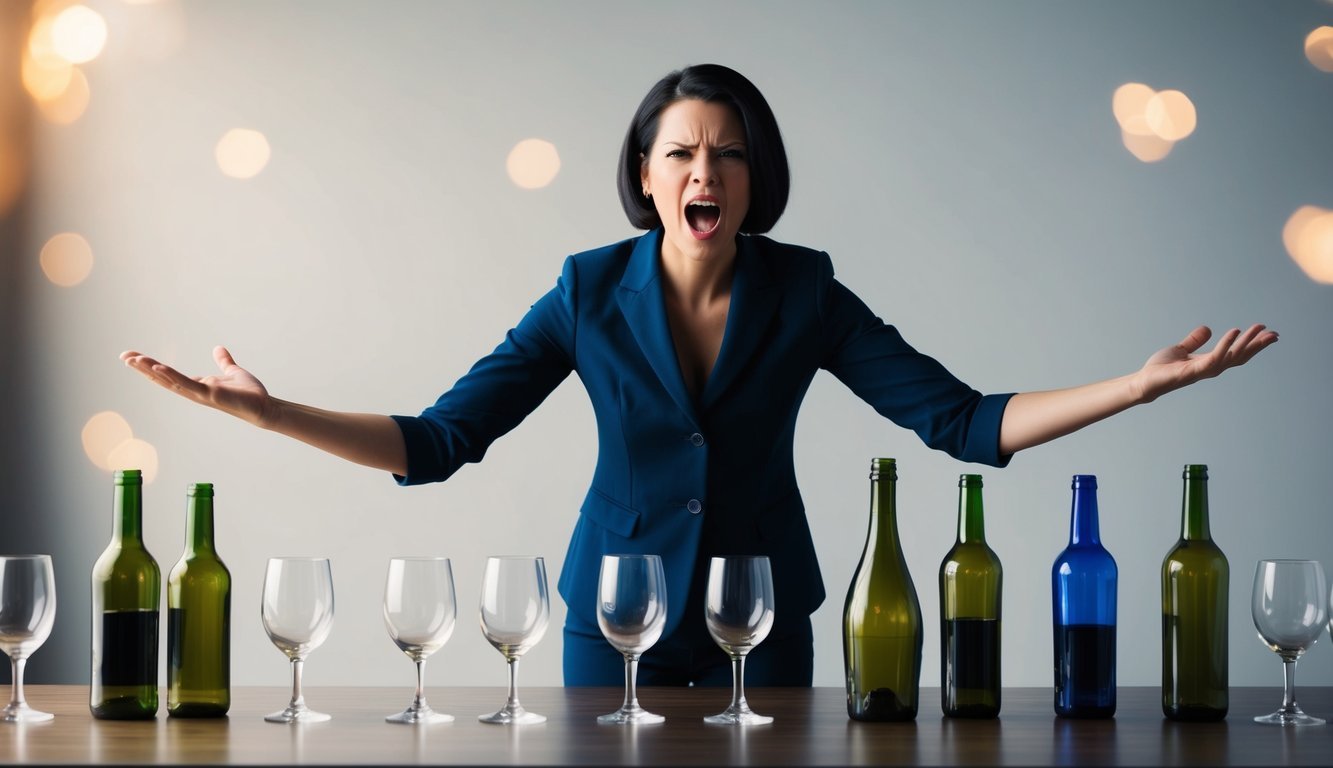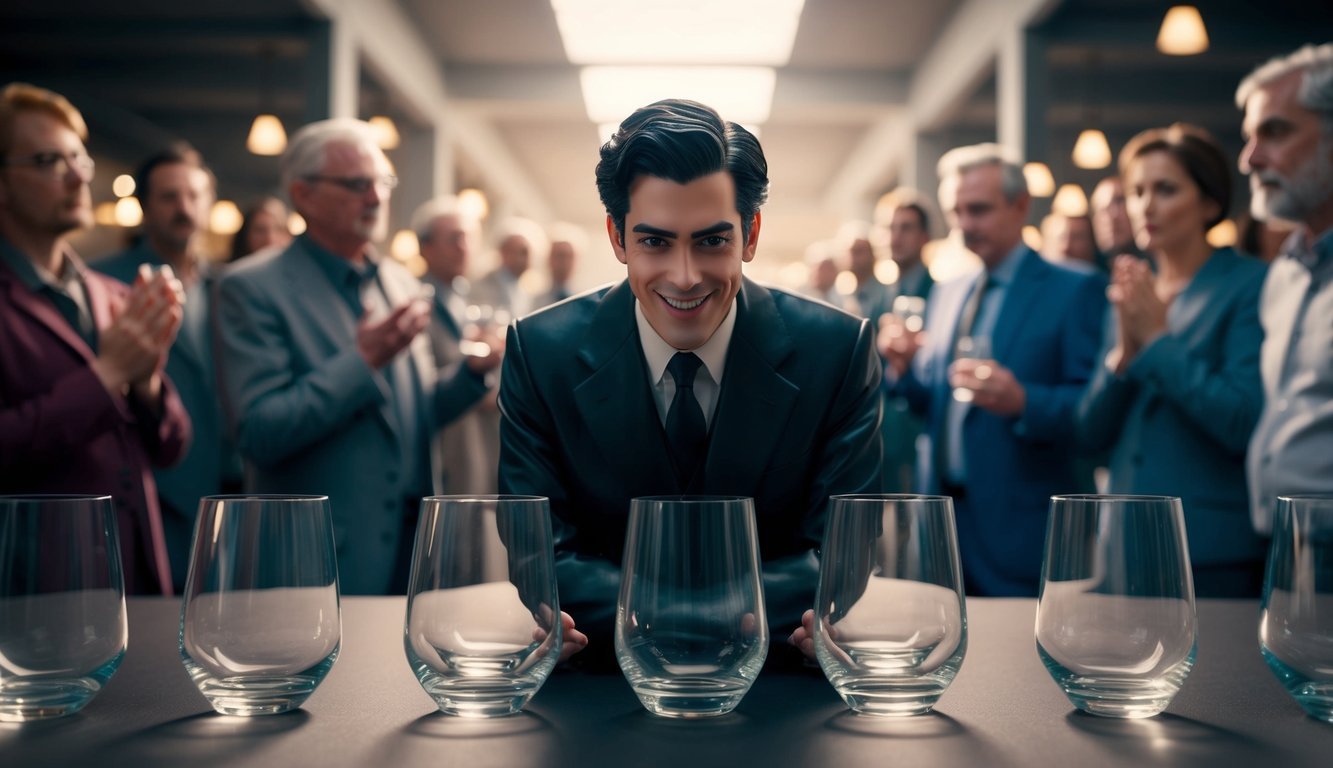Have you ever been in a situation where someone tries to spoil your good time by questioning your choices? It’s frustrating when others attempt to impose their judgment on your enjoyment.
This article explores witty comebacks to the all-too-common phrase “Don’t you think you’ve had enough?”
These clever responses will help you maintain your dignity and shut down unwanted commentary. Whether you’re dealing with a nosy friend or an overzealous stranger, having a few sharp retorts up your sleeve can be incredibly useful.
You’ll learn how to deflect criticism and keep the mood light, even when faced with unwelcome remarks about your behavior.
1) “Why stop now? I’m just getting to the fun part!”

You’ve probably heard this classic line before.
It’s the go-to response when someone suggests you’ve had enough to drink.
But why does it work so well?
This snappy comeback plays on the idea that the night is young and the best is yet to come.
It implies that stopping now would mean missing out on all the excitement ahead.
By framing the situation as just reaching the “fun part,” you’re challenging the notion that you’ve already had too much.
You’re positioning yourself as the life of the party, ready for more adventures.
This response also shifts the focus from potential concerns about your consumption to the promise of good times ahead.
It’s a clever way to deflect and keep the mood light.
Of course, it’s important to drink responsibly and know your limits.
But in the moment, this quip can be an effective way to brush off well-meaning but unwanted advice.
Remember, the key to delivering this line is confidence and a touch of playful defiance.
Your tone should suggest you’re having the time of your life and have no intention of slowing down.
2) “Nope, I’ve not reached peak ridiculousness yet!”

When someone suggests you’ve had enough, this cheeky comeback lets them know you’re just getting started.
It’s a playful way to assert your independence and keep the good times rolling.
You’re essentially telling them, “Hold my beer, I’m about to take it up a notch!” This response hints at even more outrageous antics to come, keeping everyone on their toes.
It’s a lighthearted way to brush off concerns and maintain control of your choices.
You’re acknowledging the situation while making it clear you’re not done having fun.
This quip also adds a dash of humor to potentially tense moments.
It can help diffuse awkwardness and keep the mood light and enjoyable for everyone involved.
Remember, though, to use this response responsibly.
While it’s fun to push boundaries, always prioritize your safety and well-being.
3) “I’m conducting an experiment; results pending!”

When someone questions your drinking habits, why not turn it into a scientific endeavor? Respond with a cheeky grin and declare, “I’m conducting an experiment; results pending!”
This witty comeback implies you’re not just mindlessly imbibing.
You’re on a mission for knowledge, pushing the boundaries of alcohol-related research.
Who knows what groundbreaking discoveries await?
Your “experiment” could involve testing your tolerance, exploring new cocktail combinations, or investigating the effects of different spirits on your dance moves.
The possibilities are endless!
By framing your drinking as a scholarly pursuit, you add an air of intellectual curiosity to your revelry.
It’s not excess; it’s exploration.
It’s not overindulgence; it’s dedication to the scientific method.
Plus, this response leaves your interrogator wondering what exactly you’re experimenting with.
Are you testing the limits of human endurance? Searching for the perfect hangover cure? They’ll be too intrigued to press further.
4) “Oh, come on, the calories don’t count if you’re having fun!”

This classic quip attempts to brush off concerns about overindulgence with a lighthearted joke.
It’s the kind of line you might hear at a party or social gathering when someone’s trying to convince you to have another drink or dessert.
While it’s true that enjoying yourself is important, this response ignores the real health impacts of excessive consumption.
Your body doesn’t care if you’re having a blast – those calories still count.
That said, there’s a grain of truth here.
Stress can negatively impact your health and metabolism.
So occasional indulgence as part of a fun, relaxing time isn’t necessarily bad for you.
The key is moderation.
You can absolutely enjoy treats and drinks while still being mindful of your overall intake.
Balance is possible without totally depriving yourself or going overboard.
Next time someone tries this line on you, consider a playful comeback.
Maybe something like, “Nice try, but my waistline disagrees!” Keep it light while still standing your ground.
5) “I’m in training for the food Olympics!”

When someone suggests you’ve had enough to eat, this witty comeback turns the tables on them.
By declaring you’re training for the “food Olympics,” you’re playfully asserting your right to indulge.
This response adds a touch of humor to the situation, potentially diffusing any tension.
It implies that your eating habits are part of a larger, more important goal – even if that goal is entirely fictional.
You’re essentially saying, “I know what I’m doing, and I have a reason for it.” This approach can be particularly effective if delivered with a straight face and confident tone.
Remember, though, that using humor doesn’t mean you should ignore genuine concerns about your health or eating habits.
It’s just a fun way to deflect unwanted commentary in the moment.
6) “Too late, I’m on a roll and there’s no turning back!”

This cheeky response embraces your spirited mood and determination to keep the good times rolling.
It playfully suggests you’ve passed the point of no return in your revelry.
You’re signaling that you’re fully committed to the night’s festivities.
The phrase “on a roll” implies a streak of success or enjoyment that you’re not ready to end.
By declaring it’s “too late,” you’re humorously indicating that any attempts to slow you down are futile.
You’ve built up momentum, and you’re not about to let anyone apply the brakes.
This comeback has a touch of rebellious flair.
It’s a lighthearted way to brush off concerns and assert your independence in decision-making.
Remember, while this response is amusing, it’s crucial to stay aware of your limits and prioritize your well-being.
Enjoy responsibly and know when it’s truly time to call it a night.
7) “I’m just getting my finger food fix, one snack at a time!”

When someone suggests you’ve had enough, this cheeky response can lighten the mood.
It playfully frames your snacking as a necessary “fix” for your fingers.
You’re not overeating; you’re simply satisfying your hands’ need to grab tasty morsels.
This witty comeback implies that your fingers have a mind of their own, demanding more snacks.
It’s a humorous way to deflect concern about your eating habits.
By focusing on the act of picking up food rather than consuming it, you’re shifting the conversation in a lighthearted direction.
This response works especially well with appetizers, party snacks, or any food typically eaten by hand.
It’s a fun way to keep the mood light while subtly asserting your right to enjoy yourself.
Remember, moderation is key.
While this quip can be entertaining, it’s important to listen to your body and make healthy choices.
Balance your snacking with nutritious options and stay mindful of your overall intake.
8) “No such thing as too much when you’re this fabulous!”

When someone suggests you’ve had enough, this sassy comeback puts them in their place.
It’s a cheeky way to assert your fabulousness and brush off their concern.
By declaring there’s no such thing as too much, you’re embracing your vibrant personality.
You’re letting them know you’re confident in who you are and how you carry yourself.
This response also implies that your fabulous nature justifies whatever behavior they’re questioning.
It’s a playful way to deflect their comment and keep the mood light.
Using this quip can turn a potentially awkward moment into a humorous one.
It shows you don’t take yourself too seriously while still standing your ground.
Remember, confidence is key when delivering this line.
Say it with a wink and a smile to really sell your fabulous attitude.
9) “I like to live on the edge, starting with my diet!”

When someone questions your eating habits, this cheeky response adds a dash of humor to the situation.
It’s a playful way to brush off their concern and assert your independence.
By claiming you live on the edge, you’re turning their comment into a joke about your adventurous lifestyle.
You’re implying that your food choices are just the beginning of your daring ways.
This response can be particularly effective if delivered with a wink and a smile.
It shows you don’t take yourself too seriously and can laugh off well-meaning but unwanted advice.
Remember, though, that while this reply is fun, it’s important to be mindful of your health.
If you’re genuinely concerned about your eating habits, consider speaking with a healthcare professional.
Using humor can be a great way to deflect unwanted comments about your diet.
It allows you to maintain control of the conversation without causing offense or creating tension.
Expressing Yourself Clearly
When someone asks if you’ve had enough to drink, it’s important to convey your thoughts confidently.
Use “I” statements to express your feelings without being defensive.
For example, “I appreciate your concern, but I’m comfortable with my choices.”
Be specific about your boundaries.
If you’re ready to stop drinking, say so directly.
If not, explain why you feel it’s okay to continue.
“I’ve paced myself and feel fine continuing.”
Body language matters too.
Make eye contact and stand tall to show you’re sure of yourself.
A firm but friendly tone can help get your point across without escalating tension.
Handling Peer Pressure
Peer pressure often comes in subtle forms, like questioning your drinking habits.
It’s okay to disagree with others’ opinions about your behavior.
You don’t need to justify your choices, but you can explain them if you want to.
Have some go-to phrases ready.
For example, “Thanks for looking out for me, but I’ve got this under control.” Or “I know my limits and I’m not there yet.”
Remember, true friends will respect your decisions.
If someone keeps pushing after you’ve clearly stated your position, it might be time to distance yourself from them for the evening.
Practice saying “no” confidently.
It gets easier with time.
You can even turn it into a joke if that fits your style: “Enough? I’m just getting started!” (But only if you genuinely feel that way and are drinking responsibly.)

